Michelle L. Levigne's Blog, page 162
July 26, 2014
In the Spotlight: THIS REDEEMER, by Jerusha Agen
 Today's Spotlight is on fellow ACFW member, Jerusha Agen, with her newest book:
Today's Spotlight is on fellow ACFW member, Jerusha Agen, with her newest book:THIS REDEEMER
Not all prisons have bars.
Charlotte Davis should know—she’s lived in one for years. She can handle getting slapped around by her boyfriend, Tommy, and even being forced to do things she would never choose, but when Tommy turns on her ten-year-old daughter, Charlotte must try to escape. With nowhere else to turn, Charlotte runs to the stranger her dying mother believed would help her.

Looking only for shelter or cash, Charlotte finds a family she longs to call her own and a gentle man she could learn to love. But if Tommy catches up with Charlotte, these strangers could learn the truth about her. Will they send her back to Tommy? Or can a Father’s love set her free?
Jerusha Agen is an author, screenwriter, and film critic. Check out her other titles: THIS DANCE and THIS SHADOW, Available Now!
Find THIS REDEEMER online: http://www.amazon.com/This-Redeemer-Jerusha-Agen/dp/1938092562/ref=sr_1_1?s=books&ie=UTF8&qid=1404751823&sr=1-1&keywords=this+redeemer
Or check out: www.SDGwords.com, www.RedeemerReviews.com
Published on July 26, 2014 03:00
July 24, 2014
Letters to Kel: HOW TO LOSE WRITING CONTESTS
 Warning: This is a rant. I'm judging a short writing contest. People have to prove they can write, write well, and they have something to say -- with the prize being a publishing contract.
Warning: This is a rant. I'm judging a short writing contest. People have to prove they can write, write well, and they have something to say -- with the prize being a publishing contract.Want to lose this contest?
1) Ignore proper grammar, spelling, and punctuation. Use no commas, forget the closing quote marks in dialogue, put question marks and exclamation points OUTSIDE the quotes in dialogue.
2) Don't re-read your entry before hitting the "send" button. Don't take any time to look for missing words, errors in spelling and punctuation and grammar. Don't make sure that sentences are complete and that you actually made your point before you ran out of words/space. Expect the judge to read your mind and judge you on what you meant to say, rather than what you actually said.
3) PLEASE USE ALL CAPITALS. Hurt the judge's eyes by writing in all capitals -- the equivalent of shouting.
4) Promise the readers they're going to learn about something -- and then don't deliver. Give the piece a title that has nothing whatsoever to do with the contents of your essay. Start out with a maudlin story about some sad event in your life, and then in the final paragraph quote a Bible verse with nothing to indicate what the verse has to do with the story -- and expect the judge to know what you forgot to say.
5) Waste your word count talking about the book you want to get published, without proving you can write. Talk about your life story, and then in the final paragraph tell the judge you have a novel you want to publish that has nothing to do with your life story. Talk about the ministry you want to have, that you can launch if you get a book published, while proving you have no communication skills whatsoever. Claim God told you to enter the contest. Judges love it when you try to make God a bully so you can win.
6) Ignore the rules of the contest -- word count, deadlines, submission format, etc. If the rules say entries must only be in English, then yes, please, submit your story in a foreign language. Chances are good the judges, who only speak English, will be intimidated and let you win, in fear that you will sue for discrimination.
Published on July 24, 2014 03:00
July 21, 2014
OFF THE BOOKSHELF: Defender of the Departed, by Jeff Young
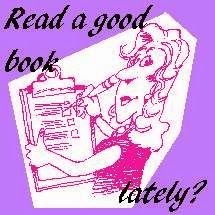 The sub-title is "A Kassandra Leydon Adventure." This is another free download I got from B&N in my search for Steampunk books and novellas to learn from.
The sub-title is "A Kassandra Leydon Adventure." This is another free download I got from B&N in my search for Steampunk books and novellas to learn from.Interesting little story. When I've cleared off my to-be-read shelf and queue, definitely going to look for more adventures of this clever, alert young woman. What's interesting is that this is definitely an "alternate history" world, where it looks like the Revolutionary War didn't take place. I'll have to read more stories about Kassandra to learn more of her world's history.
Kassandra is a young woman discovering she has some paranormal talents. She has a tutor, and sadly learns that he isn't quite what she thought. How she deals with his betrayal is ... satisfying. The hints of what she's going to do with her blooming talent are also fascinating.
I can't tell you anymore, because that would give away large chunks of this short, well-written story. Get it, read it, and if you like this type of sub-genre, you'll probably add this author and character to your "get it" list.
Published on July 21, 2014 03:00
July 19, 2014
SPOTLIGHT SATURDAY: Breathing on Her Own, by Rebecca Waters
 Today's Spotlight is on a fellow ACFW Ohio author, Rebecca Waters, with her novel BREATHING ON HER OWN.
Today's Spotlight is on a fellow ACFW Ohio author, Rebecca Waters, with her novel BREATHING ON HER OWN.Molly Tipton and her husband have finally arrived. Their daughters are grown. Two beautiful grandchildren delight their hearts and retirement is within sight. Until Molly’s older daughter, Laney, is in a terrible accident, leaving her seriously injured and her best friend dead. Worse yet, is the realization that Laney was driving under the influence of alcohol. If she can ever walk again, there’s still the risk of jail time.
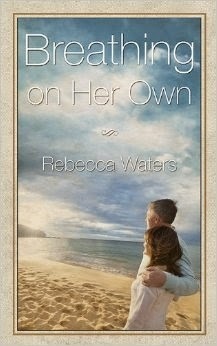
Losing control of a car is one thing, but when had Laney lost control of her life? How could God let this happen? Gripped with fear, shame, and doubt, Molly questions her own beliefs. Can her relationship with her daughter be restored? How about her faith in the God who allowed all this to happen?
NEWS!!!!
Rebecca's publisher, Lighthouse Publishing of the Carolinas, has put Breathing on Her Own in the Kindle Countdown Program now until July 22. It is available for $.99.
Breathing on Her Own is published by Lighthouse Publishing of the Carolinas and available on Amazon.com in both print and Kindle versions:http://www.amazon.com/dp/1941103154/ For more information or to view the book trailer, visit http://www.BreathingOnHerOwn.comSnag the book
Learn more! Visit Rebecca's site& read her blog
Connect! Follow her on Twitter & Like her on Facebook
Published on July 19, 2014 03:00
July 17, 2014
Letters to Kel: SOMETHING TO SAY -- but SHOULD you?
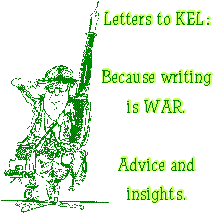 All right, so you believe you believe you have something to say. It's burning in your gut. Your mind races with images and words. Your heart pounds with righteous indignation or the glee of some mind-blowing discovery or a piece of advice that you're sure will change the world, or a story that you just know everyone will enjoy.
All right, so you believe you believe you have something to say. It's burning in your gut. Your mind races with images and words. Your heart pounds with righteous indignation or the glee of some mind-blowing discovery or a piece of advice that you're sure will change the world, or a story that you just know everyone will enjoy.In my editing work, I've come across lots of books trying to say something their authors believe must be communicated to the world. They believe they have something to say. It matters greatly to them -- but does that automatically mean it will matter to anyone but them, or their small circle of friends and co-workers?
Just because it's the most important thing in the world to you, does that mean everyone else in the world will -- or must -- feel the same way?
I've lost count of the numbers of books I've edited in the last eight years, where the author starts out with, "I've learned valuable lessons in my lifetime, and I'm passing them on to you. I'm going to teach you how to avoid my mistakes and _______________ (fill in the blank -- make your marriage better, avoid men who will do you wrong, raise intelligent children, drive the devil out of your church, etc., etc., etc., ad nauseum). Then the author proceeds to stumble through his life story, half the time talking about how people treated him wrong and how awful her life was and nobody gave her a chance and everyone she trusted betrayed her or he made stupid choices, on and on ... and yet NEVER give any details of how she solved the problems. NO LESSONS for the reader -- no stopping and saying, "Here's where I went wrong. These are the warning signs. This is what you need to do differently."
Sorry, but there are enough books full of misery with no solutions, no resolutions, no change in the main character's life -- the world doesn't need any more. The world doesn't need 150 pages of people pointing out what's wrong with the government or the economy or your neighbor's back yard or the church down the street -- with no suggestions for how to fix those problems, no plan to get out of the hole the people or government have dug themselves into. Were you as disgusted as I was, during a past presidential election, where one of the candidates said, essentially, "My opponent's plan is wrong, it won't work, my plan is going to fix this country within a few years of my being elected," and yet he never spelled out why his opponent's plan wouldn't work -- and he REFUSED to give even a hint of what his plan was? What good does that do anyone?
You believe you have something to say -- but if all you're doing is wallowing in your misery or criticizing everyone around you without offering any concrete lessons, any solid advice to your readers, it's better to just keep silent.
Published on July 17, 2014 03:00
July 14, 2014
OFF THE BOOKSHELF: Lady of Devices, by Shelley Adina
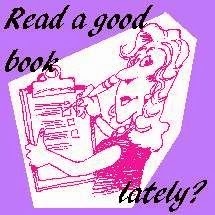 Whew! Finally worked through an avalanche of work that quite honestly gave me almost no time for reading the last few weeks.
Whew! Finally worked through an avalanche of work that quite honestly gave me almost no time for reading the last few weeks.What a treat to have TIME to sit down and just read for pleasure, instead of all the reading involved in making a living.
Even more of a treat to discover a new author and a series I want to keep up with -- in fact, when I finished this book, I got into B&N and bought a couple more books in the series.
LADY OF DEVICES by Shelley Adina is the first book in her Steampunk series about Lady Claire, a modern-minded young lady of the nobility who would rather go to the university and study engineering than attend to her Season and snag a husband ASAP -- the goal of her parents, of course. As she gears up to battle for her freedom and future, her world falls apart around her. The Steampunk world experiences its own version of the stock market crash, and her family loses everything. In short order, Lady Claire is on the run from an angry mob out to punish her family for their losses. She flees for her life, and ends up scrambling for an existence, allied with a handful of "alley mice" -- orphaned or cast-off children from London's streets. Between her technical know-how and their street smarts, they become a gang to be reckoned with, and the tales of the Lady of Devices begin.
FUN series. I bought the book because it was recommended as a grand example of Steampunk writing. I'm buying the rest of the books just because they're good and I like reading them. A great character will take you far. Can't wait to read and report on more adventures of Lady Claire.
Published on July 14, 2014 03:00
July 12, 2014
SPOTLIGHT SATURDAY: Somewhere in the Middle, by Linda Palmer
 Today's Spotlight is on a fellow author at Uncial Press, Linda Palmer, with her novel SOMEWHERE IN THE MIDDLE.
Today's Spotlight is on a fellow author at Uncial Press, Linda Palmer, with her novel SOMEWHERE IN THE MIDDLE.Though Everly Sayers makes every effort to be friendly to new student Roone Thorsen, he doesn't actually acknowledge her until he needs help with physics. Tall and a little on the teddy-bear side physically speaking, Roone falls somewhere in the middle when it come to the guys in her senior class, words actually imprinted on the black cause bracelet he wears.Turns out they have more than seventh-period study hall in common. They're both avoiding dating, if for different reasons. Since the best way to deter wannabe suitors is to be involved in a real relationship, they decide to fake one even if it means they'll have to show up at the Christmas dance as a couple.

That night is an eye opener for Everly on several levels. First of all, Roone is quite a sight in his tux, which shows off his muscular frame instead of camouflaging it the way his boxy casual clothing does. Second, the kiss they share" just for show" somehow rocks her world. And third, with a flick of a finger, Roone mysteriously maneuvers a rogue chandelier that crashes to the crowded floor, saving a lot of dancers in the process. Or did he? Not quite believing her eyes, which suddenly have hearts in them, Everly is reluctant to admit that Roone is not only as far from somewhere in the middle as possible, he just might be out of this world.
Linda Varner Palmer has been reading and writing for pleasure since the third grade and has letters from her teachers predicting she'd be an author. Though becoming a writer was never actually a dream, it was something she did naturally and eventually with intent after joining a local writers' group. Silhouette Books published Linda's first novel in l989 and the next twenty over a ten-year period (writing as Linda Varner, her maiden name). Thanks to their extensive distribution, all of her books have been translated and published all over the world. During this time, she was a Romance Writers of America (RWA) finalist twice.In 1999 Linda took a break from writing to take care of her family. She quickly learned that she couldn't not write and began again, changing her genre to young adult paranormal romance since that's what she loved to read. Linda currently has seventeen full-length novels out as e-reads and in print under her married name (Linda Palmer), two of which were co-written with her daughter, Julie Kimbrell. Two more of Linda's books are slated for release this year and next. She also has many novellas and short stories available, as well as a growing number of her Silhouette romances, which are being republished electronically by Harlequin Enterprises. Linda won the 2011 and 2012 Electronic Publishing Industry Coalition (EPIC) eBook awards in the Young Adult category for The Cinderella Swap and Nightmare, Interrupted, respectively. She loves to create covers for her own projects and for books written by fellow authors. The cover for Double Vision was a finalist in 2012 in the Ariana cover contest also sponsored by EPIC. During all the years of writing at night and on weekends, Linda never quit her day job, resulting in a simultaneous career with the federal government until she retired after twenty-two years of service. She is married to her junior high school sweetheart and happily lives in Arkansas, USA where she was born and raised. Linda's grown children, their spouses, and her five grandchildren live nearby. All Linda's books (written by Linda Varner, Linda V Palmer, and Linda Palmer) are available at www.Amazon.com. In addition, her Uncial Press books are available at www.uncialpress.com and other ebook sites online. Her website is www.lindavpalmer.com. Facebook her: Linda Varner Palmer. Twitter @ lvarnerpalmer.
Published on July 12, 2014 03:00
July 5, 2014
SPOTLIGHT SATURDAY: Legacy and Love, by Paula Mowery
 Today's Spotlight is on an author we've met before: Paula Mowery, with her romance, LEGACY AND LOVE.
Today's Spotlight is on an author we've met before: Paula Mowery, with her romance, LEGACY AND LOVE.The Prayer Shawl Sean Holland is a magazine reporter always looking for the next story. Hope Weaver is a pediatric nurse who shares Christ through making prayer shawls. The shawls are just the touchy-feely story Sean needs, even though he’ll have to endure Hope’s strong Christian beliefs to get it. An unexpected connection brings them together as a couple. But, can they find love if they don’t share their faith?
Inheritance
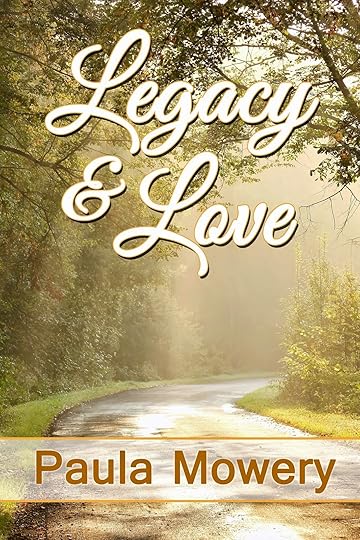
Alex Lyndon’s life has been a series of fits and starts with no finishes. She finds herself jobless and divorced. Now her only family, Granny Olivia, is critically ill. Chase Carson had to step into running the family business when his father died. The time is past due to visit Miss Olivia. Alex and Chase must go on a treasure hunt. Will each find purpose and love for their lives in the process?
Paula Mowery is a published author, acquisitions editor, and speaker. Her first two published works were The Blessing Seer and Be The Blessing from Pelican Book Group. Both are women’s fiction, and their themes have been the topics of speaking engagements. In November of 2013, her first romance released in the anthology, Brave New Century, from Prism Book Group. Legacy and Love is her first solo romance. Reviewers of her writing characterize it as “thundering with emotion.” Her articles have appeared in Woman’s World, The Christian Online Magazine, and the multi-author devotional blog, Full Flavored Living.
As an acquisitions editor for Prism Book Group, Paula particularly looks for romance stories with Christian values at its core. She’s especially attracted to those manuscripts that leave the reader mulling over the story long after turning the last page. Having been an avid reader of Christian fiction, she now puts that love to use by writing book reviews. She is a member of ACFW and is on the author interview team.
Paula is a pastor’s wife and mom to a first year college student. She homeschooled her daughter through all twelve years, and they both lived to tell about it. Before educating her daughter at home, she was an English teacher in public school. You can follow Paula at www.facebook.com/pages/Paula-Mowery/175869562589187. Learn more about Paula at her blog at www.paulamowery.blogspot.com or enjoy her monthly columns on www.christianonlinemagazine.com.
Published on July 05, 2014 03:00
June 28, 2014
SPOTLIGHT SATURDAY: The Charm Bracelet, by Susan Page Davis

 When Lisa Archer’s charm bracelet is caught in a mall escalator, she is rescued by a flippant but dashing EMT. Steve Rollins seems to understand only too well Lisa’s mixed feelings toward her escort, Dr. Bryan Cooper, who gave her the bracelet. Lisa and Steve meet again, and the sparks fly. Steve is sure Lisa hates him, and Lisa can’t help comparing vibrant Steve to mediocre Bryan, although Steve makes her furious every time she sees him. She tells Bryan she no longer wants to wear the charm bracelet, angering Brian, and both are injured in an auto accident. When Steve responds to the emergency call and finds that Lisa is one of the accident victims, his guilt weighs him down. Will he have the chance to ask Lisa’s forgiveness and start over in his clumsy attempts to win her heart? With a lot of prayer and some manipulation from Steve’s sister, he may be able to charm his way into Lisa’s life.
When Lisa Archer’s charm bracelet is caught in a mall escalator, she is rescued by a flippant but dashing EMT. Steve Rollins seems to understand only too well Lisa’s mixed feelings toward her escort, Dr. Bryan Cooper, who gave her the bracelet. Lisa and Steve meet again, and the sparks fly. Steve is sure Lisa hates him, and Lisa can’t help comparing vibrant Steve to mediocre Bryan, although Steve makes her furious every time she sees him. She tells Bryan she no longer wants to wear the charm bracelet, angering Brian, and both are injured in an auto accident. When Steve responds to the emergency call and finds that Lisa is one of the accident victims, his guilt weighs him down. Will he have the chance to ask Lisa’s forgiveness and start over in his clumsy attempts to win her heart? With a lot of prayer and some manipulation from Steve’s sister, he may be able to charm his way into Lisa’s life.
 This romantic novel has elements of Christian faith. The book also includes a bonus short story, “Wandering Irises,” by Susan Page Davis.
This romantic novel has elements of Christian faith. The book also includes a bonus short story, “Wandering Irises,” by Susan Page Davis.Susan Page Davis is the author of more than forty novels, in the romance, mystery, suspense, and historical romance genres. A Maine native, she now lives in western Kentucky with her husband, Jim, a retired news editor. They are the parents of six, and the grandparents of nine fantastic kids. She is a past winner of the Carol Award, the Will Rogers Medallion for Western Fiction, and the Inspirational Readers’ Choice Award. Visit her website at:www.susanpagedavis.com .
BUY LINKS:Buy in paperback: paperback: http://is.gd/T01JKOBuy for Kindle http://is.gd/UOPaXCBuy for Nook: http://is.gd/0YLSqKCONTACT INFO:Email: susan@susanpage davis.comWebsite: www.susanpagedavis.comFaceBook: https://www.facebook.com/susanpagedavisauthor
Published on June 28, 2014 03:00
June 21, 2014
SPOTLIGHT SATURDAY: Caishel, by Sue Perkins
 Today's Spotlight is on fellow Desert Breeze Publishing author Sue Perkins and her newest release, CAISHEL.
Today's Spotlight is on fellow Desert Breeze Publishing author Sue Perkins and her newest release, CAISHEL.Orphaned at a tender age, Caishel dons the disguise of a male to help her survive on the streets of Ardville. Sire Ailan, a noble from the floating castle of Ardon, offers her a job as his page and despite the risk of discovery of her secret, she accepts.
 Ailan immediately discovers his page is a woman, but keeps the knowledge to himself. He develops a growing attraction to Caishel, and when she confesses her true identity, he asks her to marry him. Like a caterpillar evolving into a butterfly, Caishel takes her place as the Duchess of Lan.
Ailan immediately discovers his page is a woman, but keeps the knowledge to himself. He develops a growing attraction to Caishel, and when she confesses her true identity, he asks her to marry him. Like a caterpillar evolving into a butterfly, Caishel takes her place as the Duchess of Lan.Their new life in Lan is not easy. The estate needs to be put to rights and Caishel is also convinced someone is trying to kill Ailan.Buy link: http://www.desertbreezepublishing.com/cloud-kingdom-book-one-caishel-epub/
Sue Perkins grew up in Devon, England and emigrated to New Zealand with her family. Sue and her husband enjoy their life at the top of New Zealand’s sunny South Island.Fantasy has always been one of Sue's favourite genres both for reading and writing. Caishel is the first in the Cloud Kingdom series with the second novel to follow later in the year.Other interests include genealogy, going to the gym and aqua joggin. Sue also writes children's fantasy novels and contemporary romance novels. All of her books are available in ebooks, and some are also available in print.Her aim is to write a full length epic fantasy novel.The outline is complete, and Sue hopes to finish the first draft in 2014.
Published on June 21, 2014 03:00



